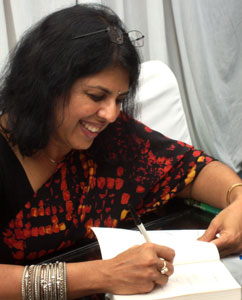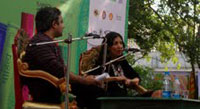It’s my first time at the Jaipur Literature Festival and I am ridiculously excited. The 150-year-old Diggi Palace is ablaze with colour, it’s a beautiful day in Jaipur, I have a bagful of books and a whole weekend of stalking (did I say stalking? I meant meeting) writers awaits me. With over 100 sessions across four concurrent locations throughout its duration, I’m spoiled for choice and in my anxiety not to miss anything good, I make the classic rookie mistake of hopping from one parallel session to another. With four sessions conducted simultaneously across different venues I have my work cut out, but I am determined to try.
 |
| Chitra Banerjee Divakaruni
signs a book |
Nobel Laureate Orhan Pamuk’s eloquent session on the art of the novel was well attended and also one of the most anticipated sessions of the festival. Pamuk explains that he describes stories through objects because he is a “failed painter” and candidly confesses that he received pocket money from his father till he was 31. Pamuk’s blunt admissions of his trials as an author are honest and endearing and combined with his biting wit, the mile- long line for his book signings are testament to his success with the audience.
Later in the day, I squeeze my way through to the Mughal Tent for a session with well known lyricist Javed Akhtar. The tent is groaning under the weight of the steady flow of people flocking in and I pat myself on the back for being able to obtain a seat. My self-congratulations, it seems, are premature as Mr. Akhtar opts to speak in Hindi. Since my fluency in the language is sadly limited to monosyllables and fragmented sentences I squeeze my way out again to seek solace in a complimentary cup of chai doled out by the chai wallas. The chai wallas of the festival deserve a mention of their own. Located at four points at the festival, the turbaned chai wallas (Or ‘the tea men’ as the lady next to me dubbed them) and their earthen cups of steaming chai were hailed with great delight by festival goers.
With its painted ceilings, numerous motifs and chandeliers, the Durbar Hall’s old world charm is hard to dismiss. During a session titled ‘A Eunuch’s life’ in the hall, A. Revathy clarifies that she is not in fact a eunuch but a member of the Hijra community. In the hour that followed, Revathy, with the help of the moderator who also played the dual role of translator, gave the audience insights into her life and the various hardships she had to face. She explained how she worked for 25 years in Karnataka previously, five of which were spent as a sex worker and how despite the fact that she was born a man, she always aspired to be a woman. The session was humbling and lifted the veil on a section of society we aren’t otherwise privy to.
I check Twitter and the JLF feed is abuzz with praise for Pulitzer Prize winning author Junot Diaz. I slip out to catch a bit of his session. The Dominican-American Diaz is self deprecatingly funny and charming and is already poised as one of the stars of the JLF after his first appearance at the festival.
The evening’s poetry readings feature work by Priya Sarukkai Chabria, Jatin Das and Meena Kandasamy. Poet and activist, Kandasamy’s inflammatory poem ‘The noble Eightfold path’ deals with the genocide of Tamils, Ali Sethi’s offering for the evening is song and even popular lyricist Gulzar is persuaded from his seat in the audience to take the stage.
On the second day it seems as though the whole world and his aunt has descended on Jaipur. Shiny- eyed school children, dishevelled college students, divas from Delhi, earnest readers – they’re all at the festival. The crowd has swollen to twice its capacity and getting a seat during sessions is a Herculean effort. I arrive late and am a little disappointed to have missed a coveted session. I accost Kiran Desai on my way to the next session to get my copy of ‘Inheritance of Loss’ signed. I ask her about her inability to attend the Galle Literary Festival and she politely tells me that the media had blown it out of proportion and that she had prior commitments in India after the conclusion of the JLF.
 |
Junot Diaz obliges
a fan |
I’m a bit wary today about which discussions to attend. My ankles stubbornly refuse to cooperate with the rest of my body and I’m left to pick my sessions with care. Javed Akhtar and Gulzar are undoubtedly the stars for the day and but personally, my highlight is Chitra Banerjee Divakaruni’s session. I’ve been an ardent fan ever since I picked up a tattered copy of ‘Sister of my Heart’ years ago from the school library and needless to say, I am thrilled to be able to meet her.
The only saving grace in the session ‘Imaginary Homelands’ is Junot Diaz (no surprises there) while Pamuk and Chimamanda Adichie manage to salvage the remnants of the session titled ‘Out of West’. Literary couple, Pamuk and Desai are the darling of the paparazzi and by this time Junot Diaz has amassed a considerable following as his books fly off the shelves of the festival bookstore. H.M. Naqvi is announced as the winner of the inaugural DSC South Asian Literature Prize and takes home 50,000$ for his novel ‘Homeboy’. The second day ends with a mix of music and poetry - Jeet Thayil, Omar Bin Musa, Ali Sethi, Salman Ahmad, Bant Singh and Madan Gopal Singh, to name a few.
Come Sunday, the crowds are still in full force. I’m outside the Durbar Hall when strains of music and applause reach my ears. Curious, I stroll into the hall and I make one of my best discoveries of the festival. Gcina Mphlophe is a poet, playwright and activist and it’s easy to see why she’s Africa’s foremost storyteller. She deftly transports a rapt audience into a graveyard in Africa and one family anecdote after another unfolds with a perfect amalgamation of memories, music and words.
Roma Tearne in her session spoke of her memories of Sri Lanka before she left for Britain at the age of 10 and explained why she has consistently refused to attend the GLF (“I left the country in a horrendous situation and I don’t feel it is appropriate to go back”). The session titled ‘The Arab novel outside Arabic’ starts off promisingly, but loses track halfway through.
The third day ends with ‘Jaipur’s got talent’. Would-be poets and writers took advantage of this opportunity to assail the audience with poetry and prose which would otherwise have lurked in the depths of an obscure blog on the internet. Admittedly though, the open mic session yielded some promising voices – but they were few and far between.
Monday is my final day and I’m reluctant to leave halfway through the festival. I’m kicking myself for missing Coetzee’s session and I would like to have stayed on for the sessions with Martin Amis, Vikram Seth, Irvine Welsh and our own Shehan Karunatilaka. Secretly I also wanted to see the mind behind ‘Sex and the City’ but let’s keep that to ourselves, shall we? Pulp fiction and poetry are on the cards for the day before I leave Jaipur. I’m introduced to Pakistani pulp fiction (which was incidentally too racy to read out on account of the school children in the audience. I leave the contents to your imagination) and K. Satchidanandan’s poetry.
 |
| Kiran Desai at a session |
With criticism levelled at the festival directors and sponsors, logistics issues and space constraints, the JLF is not without its flaws and fair share of controversy. Certain sessions were poorly moderated and some consisted solely of lacklustre reading and pitiful questions – leaving no scope for debate or discussions. And of course, with a free festival comes freeloaders and after two years of the Galle Literature Festival, I longed for the intimate nature of the GLF as I ploughed my way through the crowds and struggled to find seats for sessions.
But I head back to Delhi, weary yet jubilant. It’s easy to see why the festival is India’s Woodstock for literary lovers because the beauty of the JLF lies in its unbiased access and ‘come one, come all’ philosophy. Despite a whopping 60,000 visitors this year, the sixth edition of the festival still managed to retain its democratic nature by not charging entrance fees or tickets for sessions. With the increase in numbers and sharp rise in the festival’s popularity, it is hoped that the organizers can keep it that way in the coming years. Whether you are a socialite, corporate worker, wannabe writer, home maker or a student – for five glorious days you can immerse yourself in the colourful, informal atmosphere of the festival, meet your favourite authors and indulge yourself.
The next edition of the festival tentatively promises the likes of international writers such as A.S. Byatt, Deepak Chopra, Elizabeth Gilbert, Monica Ali, Philip Pullman, Salman Rushdie, Richard Dawkins and Hilary Mantel. As I head back home, books, swollen feet and all, I’m already planning my trip for Jaipur 2012.
What they said
A. Revathy, on being a member of the Hijra community - “I asked God why he gave me a male body and filled it with female desires”
“Novels show the capacity of the human mind better than anything else” – Orhan Pamuk, in his session, ‘The art of the novel’.
“It was my love and faith in literature that kept me going on” – Junot Diaz, on his struggle as a writer.
“Right speech is about the absence of wrong speech/ Abstain from falsehood, abstain from slander/ Abstain from harsh speech, abstain from idle chatter. /Speech can break lives and start wars/ so it is best to pull out of the peace talks” – an excerpt from Meena Kandasamy’s poem The noble Eightfold path’.
“I build a haystack and then look for the needle” – Kiran Desai explaining her writing process and describing the current book she is working on as a “mess in progress”.
“My grandmother taught my imagination to fly” - Gcina Mphlophe about the numerous stories her grandmother regaled her with.
“We were readers before we were writers and we are writers largely because we are readers” – Richard Ford in his session ‘Lay of the land’.
“I always had a feeling that I was a South Indian in my previous life” – Zac O’Yeah on his fascination with India. |




